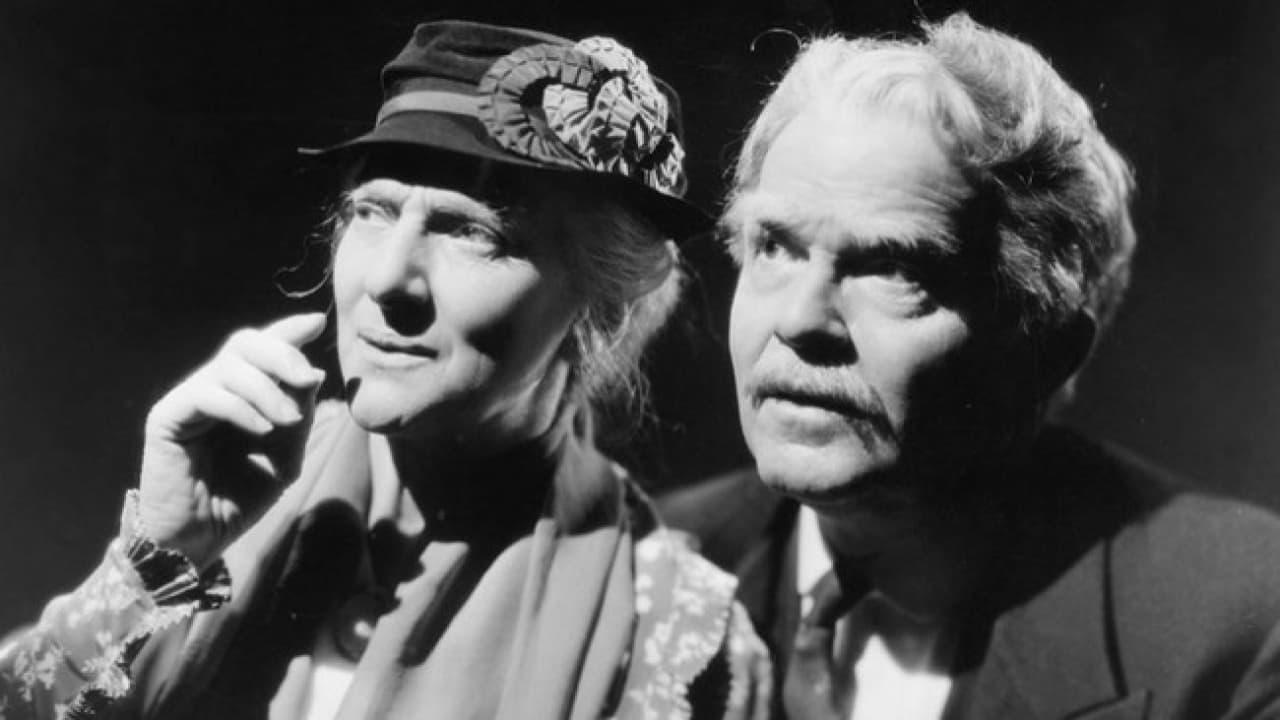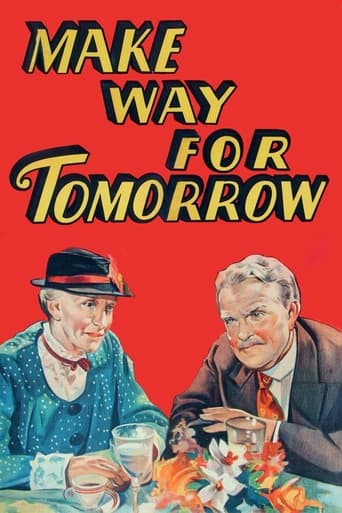

This black and white film is one I found listed in the book 1001 Movies You Must See Before You Die, it had good ratings and was obviously included in this reference, I hoped for something good, directed by Loe McCarey (Duck Soup, The Awful Truth, An Affair to Remember). Basically elderly couple Barkley "Bark" (Victor Moore) and Lucy Cooper (Beulah Bondi) lose their home after the bank forecloses on the mortgage, they now need a place to live, and they turn to their five adult children. However none of the children will take both them in and they are forced to live separately, this arrangement was supposed to be temporary for three months or until something more permanent can be arranged by the children. Lucy, aka "Ma", goes to live with her son George (Thomas Mitchell), but she always seems to in the way of him and especially his wife Anita Cooper (Fay Bainter) when she is trying to teach her bridge class. Barkley, aka "Pa", goes to live with his daughter Cora Payne (Elisabeth Risdon), but she obviously resents his very presence and arranges for him to go and live with another of his children in California. While all this is going on Lucy and Barkley do their best to maintain their dignity, in the end the couple are parted when Barkley leaves to find a job in California, he says he will send for Lucy, each make a heartfelt statement and reaffirm their lifelong love, but it seems this is almost certainly their final moment together as the train departs. Also starring Porter Hall as Harvey Chase, Barbara Read as Rhoda Cooper and Maurice Moscovitch as Max Rubens. The leading stars as the old and retired married couple who are chucked out their home and slowly broken up are likable, you believe their affection for each other with dances together and stuff, I have to admit I did find myself laughing all that much, there is supposed to be lightness with the sad stuff going on, it is certainly more tearjerking than funny, but that's not a bad thing, I didn't fully get into perhaps, but it is a worthwhile enough comedy drama. Good!
... View MoreUnemployed bookkeeper Victor Moore (as Barkley "Bark" Cooper) and his devoted wife Beulah Bondi (as Lucy) are an elderly couple with very sad news to share with their children. They are not making ends meet. On Tuesday, the bank is going to repossess the old couple's luxuriously large house. The good news is that they have five grown children, all living independently. Although there seems to be some reluctance, two of the children agree to allow Mr. Moore and Ms. Bondi move into their homes. Unfortunately, nobody has room to move both parents into the same home. There is some feeling amongst all that the separation will be temporary...This film focuses on a timely subject. The contemporary Great Depression left most people were poor, which meant more and more people went to the "old folks' home" to await death. The "social welfare" programs which reshaped the US under President Franklin D. Roosevelt were underway, but not in time for the "old folks" in this story. Obviously, they were not paying into the Social Security fund. These issues were more realistically displayed early on, in D.W. Griffith's "What Shall We Do with Our Old?" (1911). There are some oddly unrealistic qualities present in Paramount's "Make Way for Tomorrow"...The house they lose looks almost like a mansion. In the next major setting, we are located in a spacious New York City apartment, complete with nosy maid Louise Beavers (as Mamie) and carefree teenager Barbara Read (as Rhoda). Economically struggling movie-goers might not have identified with this family. Also, anyone who has cared for older relatives will note that Bondi and Moore appear to be in good physical and mental health; this is uncommon. So, we're really at a loss in comprehending how six families are unable to deal with the situation and come up with a better plan...That being said, Leo McCarey's direction and the performances herein are enough to willingly suspend your disbelief. While there is some attempt to cover Moore, the main focus is on Bondi (until the last act, which centers on Moore and Bondi) and her attempt to live with favorite son Thomas Mitchell (as George Cooper). Here is where Mr. McCarey and his crew begin to score points; we're effectively moved by the way Bondi uncomfortably joins the Cooper household. Their inability to solve the bigger problems aside, Mr. Mitchell and wife Fay Bainter (as Anita) are worthy of "Supporting Actor" awards, for their credible characterizations. In a fine last act, the film follows Bondi and Moore on a spontaneous second honeymoon.******** Make Way for Tomorrow (5/7/37) Leo McCarey ~ Beulah Bondi, Victor Moore, Fay Bainter, Thomas Mitchell
... View MoreEvery now and then, TCM rebroadcasts Leo McCarey's MAKE WAY FOR TOMORROW. And every time it airs, I have to ask-- are conditions for elderly folks better now than they were in 1937?This story haunts me a bit, I must confess, because I don't think conditions have improved too much in America since the film was made and first seen. We have just as many older folks in our country living at or near the poverty level as we ever did.The phrase 'over the hill and to the poor house' is just as relevant as ever. Except one main difference is that the plight of senior citizens is no longer viable subject matter for movies in age- conscious Hollywood.
... View MoreDuring Leo McCarey's acceptance speech for the Academy Award for Best Director he walked up and thanked the Academy then said " you gave it to me for the wrong picture." The picture he won the prize for was The Awful Truth (1937) which was also nominated for Best Picture, Best Actress, Supporting Actor and Writing. The movie he claimed he should have won for was Make Way for Tomorrow (1937) which got a big goose egg that year. Since 1937, Make Way for Tomorrow has grown in stature to become one of the most revered American movies and certainly among the best films depicting melancholy in old age.Victor Moore and Beulah Bondi star as Barkley and Lucy Cooper, an elderly couple who despite a lifetime of happiness and five children to prove it, are in dire straights. Their home is in foreclosure due in no small part by the depression. They summon four of their five children and try to come up with a game plan deciding that Barkley is to move in temporarily with Cora (Elisabeth Risdon) their impatient daughter in town while Lucy lives with eldest son George (Thomas Mitchell) and wife Anita (Fay Bainter) in his Manhattan estate. Of course as the temporary situation becomes less temporary, the couple long for each other while the kids look to move them out.Make Way for Tomorrow is arguably the saddest movie ever made; certainly the most tragic of the 1930's. It isn't a classically tragic story like "Oedipus" but a subdued, somber film that gently settles into its wistful conclusion. I say this without caution. Those who feel that cinema provides much more than idle entertainment and happy feelings should waste no time in watching this absolute gem. It brings to mind the classic Tokyo Story (1953) and the recent Amour (2012) in its touching yet unsentimental portrayal of the elderly.The film doesn't demonize the children who push their parents out of their lives for various reasons. One can easily identify with one or more of the kids due to the exemplary acting on the part of Thomas Mitchell, Elisabeth Risdon, Minna Gombell and Ray Meyer. They have their own problems both financial and social which are further complicated by the parents. Anita helps support her family by teaching bridge to socialites yet finds her young daughter running off with older men. In an effort to form trust with her granddaughter, Lucy keeps her social life a secret which understandably insights Anita to say, "What right have you to keep secrets about my daughter from me?" Yet while we as the audience can identify with the children and their own myriad of problems, we know the couple is left with little prospects for the future. The final elongated day-walk through New York City is a particularly bittersweet fifteen minutes. The couple walk hand-in-hand, being provided niceties by strangers who find their love quaint and adorable. Yet while their long-awaited day together is joyous, deep in their minds is the thought that they're still separated and likely to be so for the rest of their lives.Living in a culture that values the young, the new and the adaptive over the old, it's easy to see how this movie may one day disappear into the ether; even if it was submitted into the Library of Congress's National Film Registry. Like it's characters, the film was out of step for its time and likely even more so with today's hustle and bustle. At least the aforementioned and immortalized Tokyo Story was released by a culture that dichotomizes old vs. new instead of shoving its aged things onto the proverbial ice flow like we do. Hopefully with our median population getting ever older we'll reach an understanding where the elderly achieve a little more dignity than decades past. If not, I suppose there are pleasant things to be said about making way for tomorrow.http://www.theyservepopcorninhell.blogspot.com
... View More